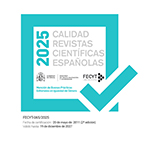Estrategias indígenas ante la constitución de una sociedad de frontera en la Bolivia republicana. Los trinitarios y la construcción de un espacio de libertad en el Beni, 1880-1930
Resumen
El proyecto socioeconómico de una emergente élite dirigente en el Beni, a partir de mediados del siglo XIX, tuvo un impacto negativo en varios de los pueblos indígenas radicados en los antiguos núcleos reduccionales que, en aras a la supervivencia grupal, elaboraron diversas estrategias. En un análisis de caso del grupo moxeño trinitario, ubicado mayoritariamente en Trinidad (Beni–Bolivia) observaremos la estrategia del grupo, liderado por su corregidor José Santos Noco Guaji, ante el avance de la frontera interna y la progresiva conformación del estado-nación boliviano. Este líder indígena, conjugó los elementos de la cultura reduccional heredada de los jesuitas –praxis social, económica y política y cosmovisión católica- con los derechos civiles otorgados a la población por la legislación boliviana –ciudadanía y propiedad- para construir un espacio, a orillas de los ríos Sécure y Mamoré, donde la población trinitaria vivió con una relativa autonomía entre las décadas de 1880 y 1930.Descargas
Descarga artículo
Licencia
La Revista Complutense de Historia de América, para fomentar el intercambio global del conocimiento, facilita el acceso sin restricciones a sus contenidos desde el momento de su publicación en la presente edición electrónica, y por eso es una revista de acceso abierto. Los originales publicados en esta revista son propiedad de la Universidad Complutense de Madrid y es obligatorio citar su procedencia en cualquier reproducción total o parcial. Todos los contenidos se distribuyen bajo una licencia de uso y distribución Creative Commons Reconocimiento 4.0 (CC BY 4.0). Esta circunstancia ha de hacerse constar expresamente de esta forma cuando sea necesario. Puede consultar la versión informativa y el texto legal de la licencia.











